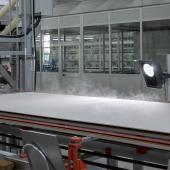Italy resumes production
The Italian ceramic industry, considered a sector of “strategic importance as it is strongly export-oriented” has been given the go-ahead to resume production activities as of 27 April.
Starting on Monday 27 April, Italian ceramic companies are now able to restart their kilns after a five-week production shutdown. The go-ahead reflects a new stance on the part of the Ministers of Economic Development, Health and Infrastructure and Transport, who now consider all export-oriented companies to be activities of strategic importance and therefore entitled to resume production after notifying the provincial Prefect. This means not only the tile manufacturers themselves, but also the entire upstream sector consisting of suppliers of plant and equipment, raw materials, glazes and colours.
The Ministers’ note effectively heeded the warnings repeatedly voiced by the entire industrial world that any extension of the shutdown would risk causing the country to lose significant market share (see the relevant statements issued by Confindustria Ceramica and Acimac).
For the Sassuolo ceramic cluster, the restart comes one week before the date of 4 May established by the Italian Government for gradually beginning to ease the lockdown restrictions (Phase 2). It can be considered a trial period subject to full compliance with worker health and safety protocols, such as the one signed on 10 April by Confindustria Ceramica and the trade unions and which companies are already observing.
In reality, not all ceramic companies in the Sassuolo area took the opportunity to reopen last Monday, preferring to wait until 4 May. Amongst the businesses that have already restarted their kilns are the largest groups in the sector, including Concorde Group, Florim, Marazzi, Iris, Panariagroup, Rondine and Italgraniti, to mention just a few. The return to full-scale production will take place gradually in accordance with the needs of each company. But it is at least a step forward that will enable companies to keep up with foreign competitors who have been able to continue operating in recent weeks or who have seen a much shorter period of shutdown. “We are currently operating at 60%,” said PanariaGroup chairman Emilio Mussini to Il Sole 24 Ore on 28 April. “This certainly doesn’t mean that everything is solved, but at least it allows us to stem the loss of customers, who were beginning to look around for alternatives to Italy.”
Phase 2: Florim launches Florim Care for a safe return to production
Ever attentive to the wellbeing and health of its employees, Florim is ready to return to operation. To protect employees, it has developed a project called FLORIM CARE based on a strict protocol and 4 key principles: Diagnosis, Distance, Digitalisation and Devices.
As well as identifying all vulnerable workers and placing them under strict health surveillance, during this initial phase the company has also set up a voluntary temperature monitoring system for employees and visitors. Workers will be provided with complete personal protective equipment (masks, visors, disposable gloves, surface sanitising products and hand sanitising gels), while the first aid team will be equipped with a supplementary kit to guarantee safety.
In order to maintain the requisite minimum distances, the company is introducing staggered working hours and different entrances; all common areas undergo regular sanitisation; the maximum number of people who may be present in an area at the same time has been indicated; and the points where there is a risk of crowding have been visually marked. The changing rooms have been closed, the muster stations for evacuation have been reorganised, and factory workers can make use of a guaranteed and simplified laundry service. A device with a proximity detection system equipped with LEDs is also under development to alert workers in the event they get too close to each other.
Office staff will continue to work from home with remote meetings and videoconferences.

Did you find this article useful?
Join the CWW community to receive the most important news from the global ceramic industry every two weeks





















